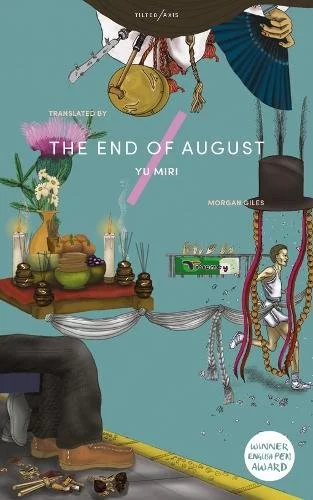The End of August by Yu Miri, tranlated by Morgan Giles (Tilted Axis Press) ~Ernie Hoyt
Yu Miri is a Zainichi Korean novelist. Zainichi Koreans are ethnic Koreans who immigrated to Japan before 1945 and are citizens or permanent residents of Japan, or who are children of those immigrants. Her native language is Japanese but she is a citizen of South Korea. She writes her books in Japanese.
She is the author of Tokyo Ueno Station (Asia by the Book, May 2021). The End of August is her latest novel. It was originally published by Shinchosha in 2007 in the Japanese language as 八月の果て (Hachigatsu no Hate). The English edition, translated by Morgan Giles, was published in 2023.
The End of August is a semi-biographical family epic. The tome is over seven hundred pages and focuses on several generations of Yu Miri’s family. The story takes place in Japanese-occupied Korea in the mid-1920’s. The reader should be warned that they should study Yu Miri’s family tree, provided at the beginning of the book, before taking on the immense task of reading this saga.
Here is a short summary of Yu Miri’s family, starting with her great grandfather, Lee Young-Ha. He was married to Park Hee-Hyang and had five children with her. They had four sons and one daughter. The eldest son was Lee Woo-Seon, followed by their daughter, Lee So-Won. Lee Woo-Cheol was the second son. His two younger brothers were Lee Woo-Gun and Lee Su-Yong.
Lee Yong-Ha also had a mistress named Mi-Ryeong. They had a daughter named So-Jin, a girl who would never meet her father. The only thing she would know about him is that he gave her her name.
Lee Woo-Cheol is married to Chee In-Hye and has four children with her. Their daughter’s names are Mi-Ok, Shin-Ja, and Ja-Ok. They named their son Shin-Tae and like his father before him, Lee Woo-Cheol has a son with his mistress, Kim Me-Yeong, who the name’s Shin-Cheol.
Chee In-Hye is Lee Woo-Cheol’s first wife. After she leaves him, Woo-Cheol marries An Jeong-Hye and has four children with her. They have three daughters and a son. Their daughter’s names are Shin-Ho, Shin-Myeong, and Shin-Hee. Their son is named Shin-Hwa. Shin-Hee marries a Japanese citizen named Yu, against her parent’s wishes. Shin-Hee and her husband are the parents of Yu Miri.
As the country becomes more unstable, Lee Woo-Cheol runs away to Japan. His brother becomes the leader of a resistance movement against the Japanese forces. Their stories are both hopeful and tragic. After running away to Japan, Lee Woo-Cheol marries a Japanese woman named Nemoto Fusako and has a son with her who he names Shin-Il. Fusako only discovers that Woo-Cheol was married and has children when his second wife, Jeong-Hee appears at their door with children in tow causing more family turmoil.
As interesting and entertaining as the story is, the book has many flaws as well. My first and foremost complaint is the Morgan Giles translation. Although the book was originally written in Japanese, the characters often speak in Korean and most of the Korean words and phrases are not translated and the translator does not provide a glossary forcing the reader to look up the words and phrases on their own or they must infer meaning from the context of what’s being said.
The writing style is also quite difficult to follow especially when Lee Woo-Cheol or Yu Miri are running. The sentences are mostly fragmented and interspersed with “inhale-exhale” making it very difficult to understand what the character is thinking.
On the positive side, the book sheds light on the atrocity and experiences of the “comfort women” - young women, sometimes as young as thirteen, who were tricked and made to serve as sexual slaves for the Japanese army. It also sheds light on the treatment of Zainichi Koreans who are still oppressed even today.
A remarkable book but a very difficult read. Be sure to invest a lot of time if you plan to challenge yourself to the task of reading it.
